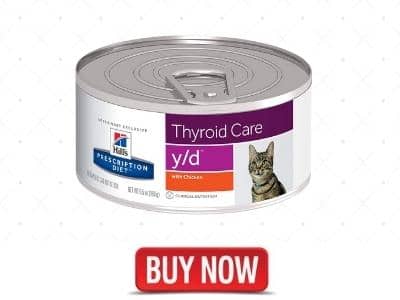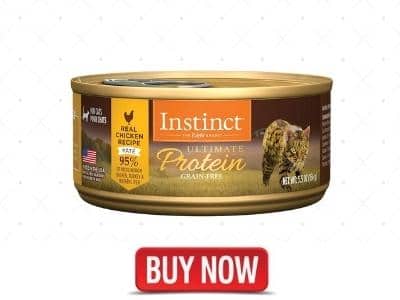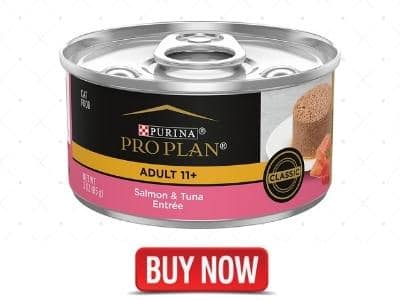
Finding out your lovely cat has recently been diagnosed with a chronic health condition could be very problematic. One such health issue is hyperthyroidism. So, if you want your pet to have a better lifestyle with the right food, it is important to consider your cat’s dietary choices.
This article will discuss all hyperthyroidism, the best food choices, and how it influences your fur friend’s years to come.
So, without further ado, let us learn more about the disease and find the best cat food for hyperthyroidism.
| Image | Brand | Price | Prime | Buy |
|---|---|---|---|---|
 Top Top | Wellness Natural Pet Food | PrimeEligible | Buy Now | |
 Top Top | HILL'S PRESCRIPTION DIET | Prime | Buy Now | |
 Top Top | Instinct | PrimeEligible | Buy Now | |
 Top Top | Purina Pro Plan | PrimeEligible | Buy Now | |
 Top Top | Weruva | PrimeEligible | Buy Now |
You might also like to read about the best cat food brands, our experts recently updated this list and also add the recall history of each food.
What Food Ingredients are Safe for Cats Suffering from Hyperthyroidism?
For cats that suffer from hyperthyroidism, a diet with highly digestible proteins can be of great help. Cats that have hyperthyroidism have difficulty maintaining muscle mass. It means you need to select food items that get 50 percent of their caloric intake from protein.
The most nurturing food items you can feed your kitties are the ones with easily digestible, high-quality protein sources.
You must avoid feeding the cat any food item with high-protein fillers like potato protein, cornmeal (gluten), wheat gluten, & pea protein.
You must avoid feeding the cat any diet that has a higher carbohydrate percentage. So, try to ensure that your pet’s food has 10 percent or fewer carbohydrates. Now, most dry foods tend to have a higher level of carbohydrates, so you need to be careful about that.
Doing this is crucial as hyperthyroidism can lead to a significant increase in your pet’s blood glucose level. It can also lead to insulin resistance and limited tolerance to glucose.
Hyperthyroidism can cause your cat to be pre-diabetic. It is why controlling the cat’s carbohydrate intake tends to avoid the possibility of diabetes development.
Apart from this, you must also avoid adding soy products to your fur friend’s diet. Soy-based products can significantly hamper your pet’s hormone production.
Low-Iodine Diet for Your Cat with Hyperthyroidism
Your veterinarian might recommend strict adherence to a low-iodine diet for a cat with hyperthyroidism. Doing this helps limit the production of thyroxine which is already too high.
Avoid feeding your pet with treats or supplements that pack in iodine. Do not worry if it seems like your cat isn’t getting enough iodine.
The prime reason for your cat’s body to seek iodine is the production of thyroxine which is already high among cats with hyperthyroidism.
Therefore, a cat diet with a tiny amount of iodine or none won’t harm your pet’s health in any way. Your veterinarian would recommend feeding the wet cat food as opposed to dry food.
It is because the latter contains a higher amount of carbohydrates.
Apart from that, dry cat food isn’t typically prepared with high-quality protein, which could be bad for cats diagnosed with hyperthyroidism.
Wet cat food has low carbohydrate content & offers your pet added hydration. Moreover, wet food is highly appetizing for cats, given the aroma and taste.
Best Food Ingredients for Cats with Hyperthyroidism
When selecting the right ingredient for your cat, it is important to fulfill their nutritional requirements while avoiding ingredients that tend to waste muscle mass. Also, avoid chemicals and additives that contribute to hyperthyroidism.
It is ideal for feeding a raw or canned diet to your pet with little or no grains, vegetables, or fruits. Canned food is any day better than dry food. Meat by-products tend to be fine for the feline family.
They are simply sources of protein like entrails and organ meats that humans do not find appetizing.
Here are the ingredients and percentages that you need to keep in mind when feeding cats with hyperthyroidism:
- 40 percent meat protein ( greater than 12 grams/100 kcal)
- Less than 10 percent carbohydrates
- Less than 250 milligrams/100kcal phosphate
- 50 percent fat
For cats diagnosed with hyperthyroidism, it is better to avoid:
- BPA in the linings of canned food
- SOY-containing diet
- Fish
- Food stored in the plastic containers
- Water or food bowls made of plastic (opt for ceramic, glass, or metal)
- Ultra-low or ultra-high iodine diets
Ingredients with high iodine content you must avoid feeding your cat include:
- Seafood– Seaweed, shrimp, & fish
- Egg-Mostly yolks
- Dairy Products– Cheese, yogurt, or milk
- Salt– Iodized salt
Ideally, your cat food should have 0.32ppm or less of iodine to keep the hyperthyroidism in check. Apart from this, you need to ensure that your cat mustn’t hunt outdoors and pick its prey. It could lead to an increase in the overall iodine level rendering your efforts worthless.
Given that hyperthyroidism increases urination frequency, it is important to keep them hydrated at all times. It would help if you also fed your cat a high protein diet to ensure they get to maintain their muscle mass without looking too lean.
Cats with hyperthyroidism convert food into energy very fast with less fat storage. It can lead to faster weight loss along with seemingly low muscle mass. So, your cat would do better with a tweaked up protein content.
Top 5 Best Cat Foods for Hyperthyroidism
1. Wellness Core 95 The Best Cat Food for Hyperthyroidism
If you are currently feeding dry food to your cat with hyperthyroidism, it is important to switch to wet or canned food right away. In this context, the Wellness Core adult cat food is an ideal choice to help with better health management.
This grain-free cat food is available in three flavors that include chicken, turkey, and beef.
The Wellness pet food is perfect for cat breeds of all sizes. Its grain-free, natural recipe delivers the right amount of nutrition without spiking up the carbohydrate content.
In addition, the cat food contains 95 percent protein content to ensure a balanced nutritional stance.
The cat food includes healthy fats, lean meats, fruits & veggies that don’t include corn, wheat, or soy. Apart from this, the wet food option doesn’t pack any artificial flavoring, preservatives, or carrageenan that might add to the hormonal issues.
Cats with hyperthyroidism need optimum hydration, and Wellness Natural delivers just that to ensure general wellbeing for the pets. Cats lack a thirst drive, and it is important to incorporate hydration through their daily diet to ensure a healthy urinary tract.
Apart from this, the Wellness Natural Canned food features a recipe that promotes long-term wellbeing while providing energy. The canned food also ensures a lustrous coat and skin along with sound digestion, immunity, stronger teeth, & healthy eyes.
Pros:
- It helps drive in more energy for a fun playtime session
- Available in a range of flavors with tasty protein content
- Contains the right amount of carbohydrate, protein, and fat
- Grain-free formula to prevent carbohydrate spiking issues
- Ideal for indoor kittens and adult cats
Cons:
- It might not be ideal for cats with a sensitive stomach
- The flavor is paler than expected
2. Hill’s Prescription Thyroid Care Canned Cat Food
Available in three different sizes of 4, 5.5, and 8.5 pounds, Hill’s Prescription cat food is an amazing option for pets suffering from thyroid issues.
The formula for thyroid care is formulated specifically by the veterinarians and nutritionists at Hill’s to ensure what your cat gets are best for their health requirements and to control the advancement of hyperthyroidism.
Hill’s prescription thyroid care cat food is proven clinically to improve your cat’s thyroid health within 3 weeks of regular usage. It is especially helpful when you feed it as the prime nutrition source for your cat.
The food contains a controlled amount of phosphorous along with low sodium content to improve your cat’s thyroid health.
Apart from this, Hill’s prescription cat food helps support better urinary and kidney health when used for a long time. The canned food is high in L-carnitine and taurine to help support heart health while ensuring a healthy pet body. It is one of the best cat food for hyperthyroidism.
In addition, the ingredients are clinically proven to supply your cat with the right antioxidants that provide your pet with better immunity.
The cat food contains a high amount of quality chicken and pork liver as some prime protein sources. In addition, the cat food is enriched with high-quality minerals and vitamins, along with proper hydration guaranteed.
Pros:
- It helps decrease the signs of hyperactivity and weight loss
- It helps reduce thirst pangs with optimum hydration
- It helps introduce good-quality skin & coat conditions
- Powerful nutrition supply with an irresistible taste
- Reduces any risks related to the development of urinary crystals
Cons:
- Some cats might not like the texture of the food
- The smell can be a tad intimidating for some cats
3. Instinct High Protein, Grain-Free Canned Cat Food
Available in rabbit and chicken flavors, the Instinct canned cat food is the ultimate diet for cats suffering from hyperthyroidism. The cat food is perfect for breeds of all sizes and doesn’t contain any grain to avoid adding up to the carbohydrate levels in the food content.
It contains a whopping 95 percent of high-quality protein that comes from turkey, chicken, & liver. Moreover, all the ingredients added to the cat food are sourced responsibly.
The chicken used for the food is cage-free and makes up for a perfectly delicious meal/topper for dry food served to your pets.
Best of all, the Instinct Cat food doesn’t contain any fillers that might contain low-quality ingredients known to rake up the thyroid hormones.
In addition, this canned food is made without potato, grain, corn, soy, wheat, carrageenan, preservatives, or artificial colors that can trigger a lot of food sensitivities in cats. All of these features make it the best cat food for hyperthyroidism.
The formula is created from high-quality real meat and whole food packed with proper protein content. The food helps develop strong, lean, high-quality muscles and can be served in a full meal or a topper for dry food.
With a taste so good, even the pickiest eaters would love to clean the food right out of the bowl each time you serve.
Pros:
- Formulated in the United States with best-quality ingredients
- It contains 95 percent protein from turkey, chicken, & liver
- Grain-free formulation to keep the carbohydrate levels down
- Easy-to-digest protein from cage-free rabbit and chicken
- It contains a good amount of thiamine
Cons:
- It might contain bone shards; check before serving
- It has a water consistency
4. Purina Pro-Plan Canned Wet Food for Senior Cats
An amazing choice from the line of high-quality wet food by Purina, the Pro-Plan wet food for senior cats is designed to keep hyperthyroidism in check. The cat food is available in salmon and tuna flavor and chicken, turkey, beef, ocean whitefish, and salmon.
The formula is loaded with a proper amount of water to ensure your cat gets the right amount of hydration.
The wet food for cats consists of real protein and is formulated especially for senior cats above the age of 11. Purina also supports a healthy coat and skin while relieving any irritations or allergies with certain cat food options.
The cat food provides high-quality essential nutrients to support your cat’s immune system and maintain better health in the long run. The protein in the formula is highly digestible and delivers optimal nutrients to the cat’s body.
Pro-plan offers a science-based nutritional design that helps adhere to your senior cat’s unique preferences and traits. The advanced formula helps support better weight management and urinary health while ensuring healthy aging.
In addition, the Purina Pro-Plan provides your cat access to targeted nutrition that is paired with an exceptional taste for fussy eaters.
With each serving, your pet gets access to 25+ essential vitamins & minerals that include the likes of taurine that supports the cat’s overall health.
Pros:
- Budget-friendly canned cat food for hyperthyroidism
- It doesn’t contain any artificial colors or preservatives
- Ideal for cats with a sensitive stomach
- Prevents vomiting or bloating issues
- It helps retain a healthy weight level with optimum energy levels
Cons:
- High phosphorus content might not be ideal for cats with kidney problems
- It contains fish which could add to the iodine content
5. Weruva TruLuxe Natural, Grain-Free Canned Food
The Weruva grain-free canned food is a delectable flavor that includes ingredients designed specifically for cats suffering from hyperthyroidism. In addition, the formula contains 4 amazing and luxurious protein elements that include grass-fed lamb, beef, turkey, and cage-free duck.
The variety pack comes in a bundle of 6 Peking Ducken, Quick-Quirky, Steak Frites, & Glam-Punk. Its limited ingredient formula allows the makers to focus on provisioning the best quality recipe with premium-cut meat & seafood that helps keep your cat in its optimum health.
Additionally, the grain-free canned food supports a properly functioning urinary tract while keeping the diet low in magnesium, phosphorus, & ash. The canned food also provides your cat with optimum hydration levels.
Finally, the Weruva food for cats is gluten-free and ensures that your pet doesn’t suffer from any digestive allergies that might trigger hyperthyroidism.
The canned food is free of corn, soy, wheat, or any preservatives and artificial colors for the better hormonal health of your cats.
In addition, Weruva is produced in the best-quality human food manufacturing units that follow strict standards for quality checks to ensure your pets get the best nutrition.
Pros:
- Produced from ethically sourced chicken, beef, tuna, etc
- It doesn’t contain any BPA that might trigger hormonal issues
- It doesn’t contain a lot of carbohydrates or unnecessary calories
- Ideal for cats suffering from kidney issues
- Perfect for picky eaters and has a great smell
- The best cat food for hyperthyroidism
Cons:
- The texture is inconsistent, might be watery
- A bit pricey as compared to the competitors
What is Hyperthyroidism in Cats?
Hyperthyroidism among cats is a commonly occurring glandular condition that has become very prevalent among pets nowadays. It means that several pet owners are currently dealing with this particular experience.
However, pet owners tend to get confused between the terms “Hypothyroidism” and “Hyperthyroidism”. These two terms are different in terms of medical explanation. So, make sure you clear it up with your veterinarian before changing the pet’s diet or bringing about any major changes.
If your pet has been diagnosed with hyperthyroidism, you need to follow a different diet than the one with hypothyroidism. Hyperthyroidism is an endocrine issue that is found commonly among elderly cats.
It is caused when your cat’s body produces many thyroid hormones due to a tumor present on the crucial thyroid gland. However, this tumor mostly isn’t cancerous.
A higher inflow of thyroid hormones throughout the cat’s body could cause an elevation in the metabolic rate. When this happens, it could lead to added stress on your cat’s heart, nervous system, liver, & other critical organs.
When left unchecked for long, this issue can even be deadly.
In simple terms, hyperthyroidism occurs when the cat’s thyroid glands become overactive. It is common among older cats. About 94 percent of cats that are diagnosed with hyperthyroidism tend to be 10 years or older.
Now, this doesn’t mean that younger cats don’t have to worry about it. It does occur among young cats, but it is rarer.
Just like humans, the cat’s thyroid gland can be found in the throat area. It features two lobes that sit on both sides of the pet’s windpipe. It is important for producing the substance known as thyroxine which helps control the body’s metabolism and breakdown the fat content.
It is also important for the RBC’s production & it can also affect the heart rate.
A cat diagnosed with hyperthyroidism tends to produce more thyroxine as compared to healthy cats. You can also feel that the gland has enlarged & even see it visually.
A hyperactive thyroid gland leads to a faster metabolism. It causes the cat to drink and eat more with rapid weight loss.
These thyroid tumors are mostly benign & can be treated successfully with surgery or medication. With proper medication and thorough diet management, pets with hyperthyroidism can live for years without any complications.
How Does Hyperthyroidism Develop in the Cats?
Hyperthyroidism isn’t caught as easily as a standard pet disease. Given that it is a chronic disease, it develops slowly with time. So, at first, you might not notice there is any problem with the cat. The initial signs and symptoms of hyperthyroidism are increased thirst and appetite.
You might not notice this up until your fur friend’s coat starts deteriorating.
This disease doesn’t just affect one aspect of your body which makes the diagnosis difficult. The common symptoms of hyperthyroidism in cats include:
- Heavy breathing
- Increased thirst
- Enhanced appetite
- Weight loss
- Restlessness
- Excessive shedding
- Diarrhea
- Frequent use of the cat litter box
- Vomiting
- Panting
- Higher heart rate (closer to pounding)
- Behavioral changes
- Unkempt appearance
- Hyperactivity
- Drinking and eating more
- Unusually anxious/nervous behavior
- Lump present in the center of your cat’s throat
If you see these symptoms in your pet, it is important to visit your veterinarian as early as possible. Several possible health conditions might mimic these symptoms. So, it is important to check with the veterinarian.
Your vet might consider blood testing to confirm the possibility of hyperthyroidism. If the T4 levels surpass the normal standards, it confirms that your fur baby has this condition.
Therefore, it is important to get a diagnosis as soon as possible to make real and healthy changes in your pet’s life.
To educate new furkid parents we recently added a few new resources; is it cheaper to make your own cat food? and Why do dogs eat cat food? That discusses what dogs like in cat food and why they prefer to grab it as well as how you can stop them.
Few cats bury their food if your’s is also one then it’s not a point to worry just find our reason, we list the most common ones and find out what cat food tastes like?
Lastly, we make a list of 30 human food that cats can eat besides cat food so we can choose to feed when out of cat food.
Conclusion
Hyperthyroidism can be difficult to manage depending on how late the diagnosis happens. Keep an eye on your cat’s symptoms to ensure that they aren’t suffering from any.
If you do find any symptoms showing up, it is important to get in touch with your veterinarian soon. When choosing between dry or wet food, the latter is preferred for cats suffering from hyperthyroidism.
It provides optimum hydration while providing top-notch protein content for your cat’s health maintenance requirements. If your cat is 10 years or more, it is important to schedule a regular check-up every 3 months to pick any symptoms that might surface and point out to the start of hyperthyroidism.





